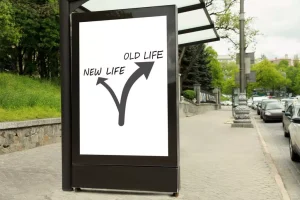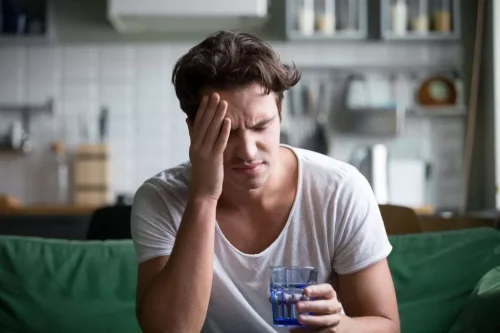
The high levels of salt and sugar content in your alcoholic beverage, may trigger the hormone IGF-1, which causes an over-production of oil in your skin. If you’re simply looking to speak to someone on the phone or chat online for more advice on your own or someone else’s drinking, get in touch with Drinkchat or Drinkline. If you’re worried about your drinking, get in touch with your local GP surgery, who will be able to help. Or if you’re just thinking about taking a break from alcohol, for your own reasons or as part of a challenge, you will be joining millions of others.
- After you drink alcohol, Volpicelli explains that the small molecules inside it get absorbed by your gut.
- Other ways to get help include talking with a mental health professional or seeking help from a support group such as Alcoholics Anonymous or a similar type of self-help group.
- This is the period in which delirium tremens is most likely to occur, which requires immediate medical attention.
- Drinking can send your hormones into a frenzy—it impacts our endocrine system, which allows our body to respond appropriately and cope with changes in our environments.
Mild Symptoms
- That’s why it’s vital to consult a physician before you stop drinking in order to create a plan to stop drinking or taper down safely.
- If symptoms start to develop, seek medical assistance immediately.
Then, we’ll learn about the benefits of quitting alcohol and ways to stay sober for the days, weeks, and months to come. As always, check in with a healthcare professional to be sure you avoid serious withdrawal symptoms. People who drink heavily and those with alcohol use disorders may experience uncomfortable mental and physical health effects when they cut back or stop drinking alcohol abruptly. They can create mild distress or severe danger, depending on how much you drink and how long you have been drinking.

months after you stop drinking alcohol:
- It can also increase your risk for many different types of cancers.
- While not everyone who quits drinking will experience withdrawal, you are more likely to have symptoms if you have been drinking for a long time, if you drink heavily, and/or if you drink frequently.
- Cut those from your diet—and don’t replace them with desserts—and you’ll start to lose weight without much effort.
- Depending on how much or how often you drink, your age, and your health, the risks may overwhelm the benefits of drinking.
Contact us today to learn how you can gain lasting freedom from alcohol. They will become less intense, and symptoms will disappear one by one. Physical symptoms will be much better by a week after stopping for most people. Now that you understand the impact of alcohol on your health, embracing a life free from its influence becomes an empowering journey of self-discovery. With a strategic plan to navigate challenges plus a support system, achieving sobriety is not only within reach but transformative. Taking charge of your well-being, each step toward a sober existence becomes a stride toward a healthier, happier, and more resilient version of yourself.
- Alcohol is also linked to poor sleep quality, so you might feel more energized after a week without alcohol, she added.
- So, giving up alcohol can help you to avoid these potentially deadly diseases.
- Taking charge of your well-being, each step toward a sober existence becomes a stride toward a healthier, happier, and more resilient version of yourself.
- Both the World Health Organization (WHO) and the Canadian Centre on Substance Use and Addiction have determined that there is not safe amount of alcohol.
- Or maybe you’re just looking to improve your health, wake up hangover-free and give your liver (and your heart and brain) a break.
Lower Cancer Risk
For mild alcohol withdrawal that’s not at risk of worsening, your provider may prescribe carbamazepine or gabapentin to help with symptoms. According to the Dietary Guidelines for Americans, alcohol should be consumed in moderation — up to one drink per day for women and up to two drinks per day for men. Cutting out alcohol for 30 days can have benefits for those who drink more than the recommended limit of two drinks a day for men and one drink a day for women. The current Dietary Guidelines for Americans recommend that alcohol should be consumed in moderation — up to one drink per day for women and up to two drinks per day for men. Alcohol dependence can make it harder to think or remember things.
“By eliminating alcohol, your mood stabilizes and you may experience reduced sadness, alcohol-induced anxiety and overall emotional well-being,” says Andrews. You can manage stress and cope with life’s challenges in healthier ways, she says. And as a central nervous system depressant, alcohol can worsen mental health conditions such as depression, anxiety and panic disorder, says McMahon. No amount of alcohol consumption is established as safe for cancers and overall health, notes the World Health Organization. Like ultraviolet radiation, asbestos and tobacco, alcohol is classified by the International Agency for Research on Cancer as a Group 1 carcinogen—the highest-risk group. Keep in mind, though, that research on whether alcohol is a risk factor for weight gain is mixed.

Can cutting out alcohol bring about health benefits?
It is worth mentioning that nutritional status improvement occurs when someone strop drinking, which is one big reason why people may see many of the above improvements with sobriety. Fortunately, reducing your alcohol use can help improve your sleep over time, although you might experience more sleep disturbances for some time after you quit. You may also begin to notice a number of improvements in your physical health.

Improved Mood
But as you continue to drink, you become drowsy and have less control over your actions. There are many benefits to your health if you cut out alcohol completely. Therapy can help you understand why you drink and learn new habits so you can live a healthy lifestyle that doesn’t rely on alcohol as a crutch.
After 6 months:

Your calorie intake will be about 9,000 calories less, leading to a potential drop in weight of about three pounds. While you will still likely have some alcohol cravings, you will probably feel pretty good about quitting alcohol. When you quit alcohol after using it consistently, your body spends about a week to a week and a half adjusting to its absence. This can create dangerous withdrawal symptoms but will typically fully resolve within two weeks.
Steering clear of alcohol, however, gives the liver a chance to regenerate. “Cutting out and abstaining from alcohol can recover a substantial portion of liver function,” Wirtz says. “When we stop drinking, we can begin to repair some of the long-term effects of alcohol use.” Alcohol and heavy drinking what happens when you stop drinking can cause long-term, negative impacts on the brain, including poor memory and slower reflexes. Over time, the brain can actually get used to the effects of alcohol, causing it to work harder and cause unpleasant or even dangerous withdrawal symptoms like tremors and heart palpitations.

